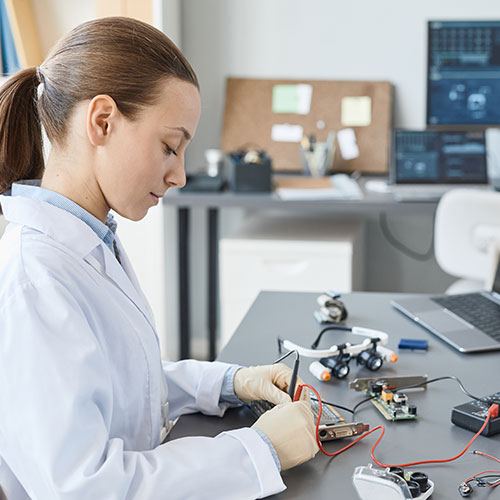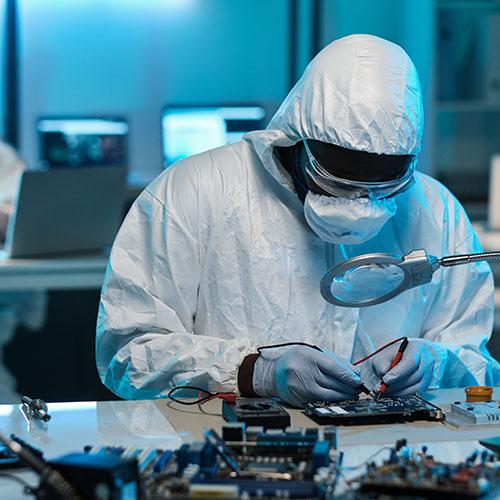Learn how education institutions and employers have made BMET positions available, flexible, and fruitful.
Who are biomed technicians? They work in hospitals, medical clinics, and medical equipment manufacturing facilities responsible for providing crucial medical devices like infusion pumps and ventilators. While they don’t tend to patients directly, they make healthcare delivery possible for doctors and nurses by supplying them with the care equipment they need. A biomed technician’s responsibilities include:
- Repairing equipment
- Performing preventative maintenance of equipment
- Coordinating with medical IT departments to address any networking issues within the equipment
… to help medical divisions deliver the best care to their patients.

In an article on Technical.ly, “Biomedical equipment technician: The opportunity-filled medtech job you’ve never heard of,” Randy Libros, Associate Professor of Physics, and Dr. Tammy Wooten, Assistant Professor of Chemistry at the Community College of Philadelphia outline the importance of BMETs in the healthcare network:
“A ton of knowledge and experience will go out the door when these professionals retire,” one survey respondent lamented, while simultaneously highlighting the general ‘lack of awareness’ about the field,” per 24x7 Magazine, a publication that conducted an annual survey of BMETs currently working in the field.
So, you’re thinking about enrolling in a BMET program. Here’s what you can expect from employers:

- Good pay (the median salary for BMETs in 2020 being $51,610 per year)
- Comprehensive benefits (which can even include tuition allotments or reimbursements)
- The opportunity to begin working as a BMET with a certificate while studying for the degree (since some employers, but not all, require a degree)
Libros and Dr. Wooten highlight that the Community College of Philadelphia currently offers a BMET program taught by experts that actually work in the biomedical field. The program consists of a Level 1 and Level 2 certification (each varying in theory and hands-on experience) and the ability to complete either certification in just one year before starting work in the industry.
There are plenty of resources for aspiring biomed technicians in the healthcare industry including the numerous biomed associations AIV currently works with. For over 35 years, AIV has been helping biomedical professionals thrive in their workplaces by extending the life of their equipment by offering replacement parts, products, and repairs.
We offer several lines of new and recertified replacement parts for infusion pumps and fetal monitoring equipment. We also have a full-service repair depot at our Harmans, Maryland facility to handle infusion pump, Tram/MMS module, telemetry transmitter, and fetal transducer repairs.
For more information about equipment repairs, infusion pump parts, or to learn more about how AIV supports biomed technicians and biomed associations, contact us or visit our biomed associations page.
About the Author

Laura Collier
Laura Collier has a Bachelor’s Degree in Communications and a Master’s Degree in Business Administration from the University of North Florida. She is the Marketing Manager at AIV, Inc.
